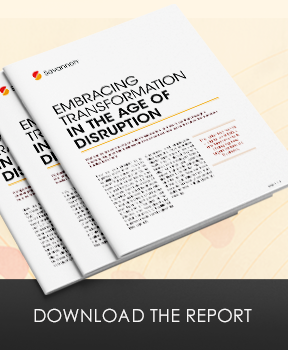Companies are embarking on bold transformation journeys to see them through a challenging, uncertain business landscape and set them up for the future, but numerous hurdles face them.
 How do you prosper in a business environment in which volatility and disruption are the norm? That is a question facing every organisation today, and not just because of a global pandemic. Even before Covid-19 upended the world, businesses were being forced to deal with uncertainty driven, on a macro level, by a fraught geopolitical landscape either side of the Atlantic, and more directly by digital disruption to traditional business models and a growing ESG agenda.
How do you prosper in a business environment in which volatility and disruption are the norm? That is a question facing every organisation today, and not just because of a global pandemic. Even before Covid-19 upended the world, businesses were being forced to deal with uncertainty driven, on a macro level, by a fraught geopolitical landscape either side of the Atlantic, and more directly by digital disruption to traditional business models and a growing ESG agenda.
The latter two trends – digital and ESG – are fundamentally changing how organisations do business.
Customers and employees alike expect a more seamless digital experience in life and work, and to interact only with brands and employers which align with their own personal values. High-profile campaigns like Black Lives Matter, Me Too and Extinction Rebellion have shown organisations they must consider a much wider pool of stakeholders in their decision making.
All of this, and more, has driven organisations across all sectors to the realisation that business transformation is not a luxury – it’s necessary to survival. According to research by Innosight, the average company lifespan on the S&P 500 list was 33 years in 1965. By 1990, this had shortened to 20 years, and it is expected to shorten even further to just 14 years by 2026. A similar trend is replicated across all stock market indexes. Complacency is just not an option.
“We’re living in interesting times,” says Herve Sodatonou, partner and head of Savannah Group’s management consulting arm. “Even before Covid, which we now know was a massive accelerant of digital adoption, technology was becoming a real enabler of change, allowing organisations to develop, deploy and roll out new products and services globally, unbelievably fast.
According to research by Innosight, the average company lifespan on the S&P 500 list was 33 years in 1965. By 1990, this had shortened to 20 years, and it is expected to shorten even further to just 14 years by 2026.
CULTURAL REALIGNMENT
Organisations are increasingly recognising they need to adapt their operating models to engage with a global workforce in a different way. The traditional group structure of having a large mothership in London and then remote satellite offices that work almost independently is changing very quickly. Companies are realising they have to draw people in closer and ensure everyone is more culturally aligned within the group, which means looking at remote working strategies and workforce planning.
Typically, technology is the enabler when it comes to restructuring or repurposing parts of an organisation. Yet while awareness of the need to transform is very high now, the same can’t quite be said for execution. A study by McKinsey found that as many as 70 per cent of transformation programmes fail, which can be extremely costly while setting back organisations even further from their competitors. Often, these failures can be attributed to an overreliance on technology and not enough focus on the most essential element of any transformation: people.
“You can have the best strategy in the world, but if it’s not implemented well it will fail,” Sodatonou adds. “It’s important to ensure that you have got the right people delivering the right parts of a programme, and that you’ve also got the right people within your business to hold them to account and make sure that the deliverables and milestones are met. There is no beginning and end state to transformation, so you’ve also got to ensure that the transformation skills remain with the business, which means working with an expert partner over the long term.”
TRUSTED RELATIONSHIPS
At Savannah we believe people drive performance and it is vital to find the right fit to drive your transformation projects forward. Supported by our expertise in executive search and interim management, data insights – and deep, trusting relationships with our clients – Savannah’s management consultancy partners with world leading organisations to drive the success of transformation programmes.
With expertise in HR, People and Organisational Advisory, IT and Digital Advisory, Finance and Regulatory Advisory, and Corporate Strategy, our worldclass expert consultants are individually selected and matched to transformation projects. Savannah’s innovative consulting hybrid model provides a rapid yet flexible response to tackling any business challenges, working together to shape the most suitable team structure to maximise transformation results.
As an independent, solution agnostic consultancy, you can be assured that any diagnosis and recommendations is based on exploring the best approach for your organisation.
“We have a vast array of client relationships at the top level and clients trust us immensely on their most trusted appointments,” says Sodatonou. “We’re being asked if we can bring in people with specialist skill sets within the talent and HR arena, and bring people in as consultants to advise through change, transformation and growth. It’s really about leveraging our existing trusted relationships.”
“As a consultancy, we are ultimately a talent business. We are very good at identifying people, approaching them, engaging with them and then bringing them into organisations.” — Herve Sodatonou
The employee base is shifting significantly and organisations must change to adapt to accommodate that very quickly. Agile resourcing methodologies, such as those adopted in Savannah’s innovative consulting model, will arm businesses with the flexibility they need to remain relevant and thrive amidst the next set of unforeseeable disruptions that will no doubt emerge.


